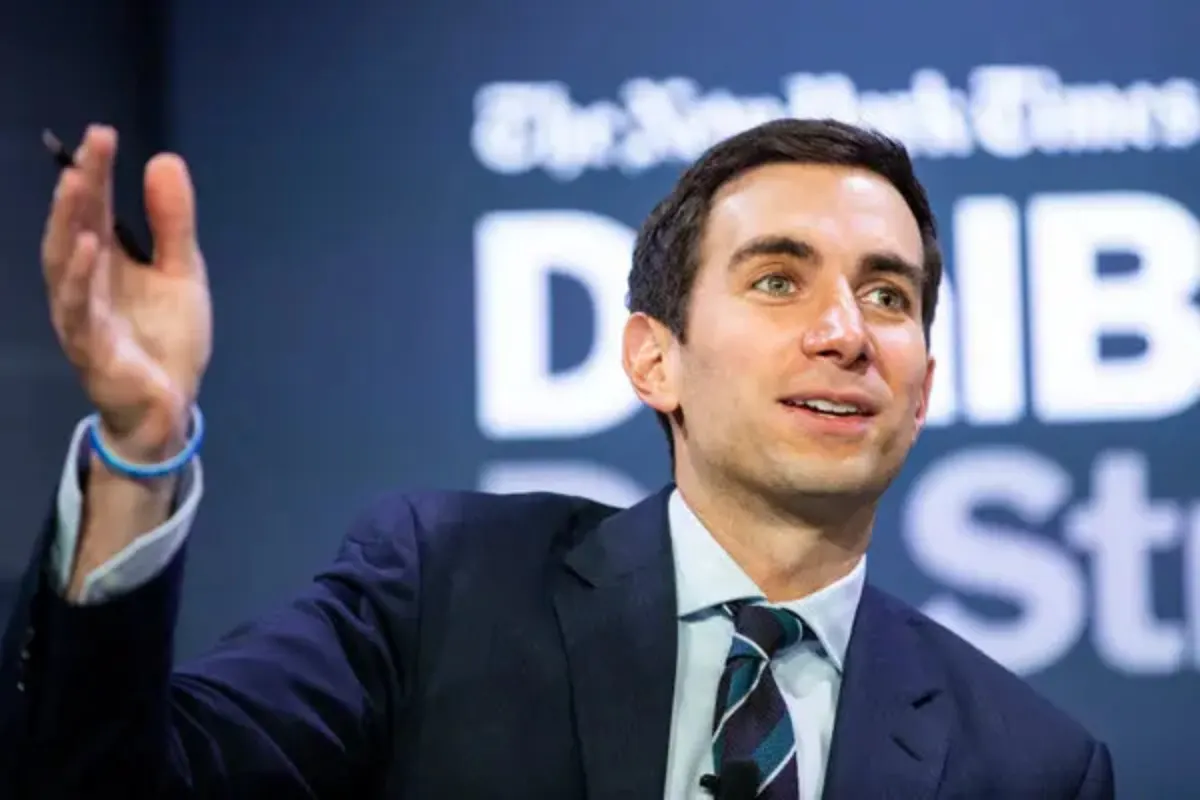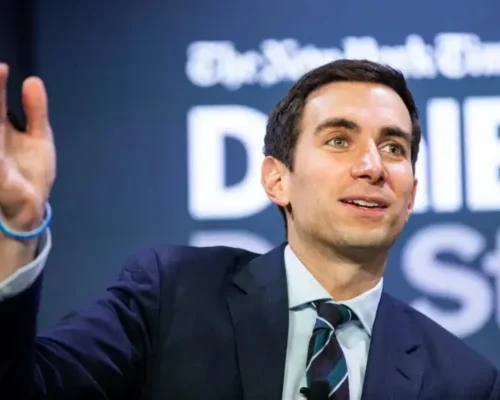Imagine being Andrew Ross Sorkin on the NYSE floor with digital screens that seem to be flickering like fireflies during a storm, and where even a wrong whisper can bring down empires. It is October 2025, and the financial guru, a day after his 60 Minutes CBS interview that is rapidly spreading on the internet, is looking into the abyss and saying “1929” as if he were a modern Cassandra. As the stock market has risen by 90% since 2020, when the AI frenzy began, Sorkin says we are very close to a crash, but the safety barriers are being dismantled through deregulation. His new book, “1929: Inside the Greatest Crash in Wall Street History,” is not merely a work of history; it is a reflection of our bubbly markets, in which meme coins rise abruptly on a joke and CEOs keep silent. For American investors who are either recovering their portfolios or considering retirement, Sorkin’s warning signal is obvious: Boom or bubble? As tariffs rattle Asia and BlackRock eyes crypto for 401(k)s, this DealBook maestro’s insights cut through the noise. Buckle in, we’re tracing his ascent from cub reporter to market whisperer, unpacking his crash prophecies, and why his voice matters more than ever in these jittery times.
From Scribe to Sage: Early Days and the NYT Launch
In 1977, Andrew Ross Sorkin was raised in New York City, where his father was in real estate and his mother was a teacher. Consequently, he was the beneficiary of the good and bad times of the 1980s in the stock market—the bull market’s shine and the crash of ’87’s austerity. He took history at Cornell, graduating in 1999. Sorkin turned down law school to go straight into journalism, at which he had immediate success—he was hired by the New York Times right after college. At 22, he was the youngest deal reporter on the block, chronicling mergers like AOL-Time Warner’s $165 billion folly, a cautionary tale of hubris he’d revisit decades later.
Sorkin’s edge? Relentless shoe-leather: He would spend time in boardrooms, unconsciously getting information from executives who only saw a new kid with fresh eyes and not worn-out experience. Through 2004, he had created DealBook, a daily newsletter that explained M&A madness, regulatory turns, and C-suite scandals. An email blast to 1,000 recipients was the beginning of the journey, and the following was a fanbase that grew to 500,000 by 2010, thus becoming essential reading for everyone from Jamie Dimon to day traders. “It’s like a cocktail party where the powerful spill secrets,” he quipped in a 2015 profile, blending gossip-column flair with forensic finance.
His breakthrough book, “Too Big to Fail” (2009), immortalized the 2008 meltdown: A fly-on-the-wall epic of Hank Paulson’s Treasury bunker, Lehman’s death throes, and Obama’s Oval ascent. Optioned for an HBO film he co-wrote, it snagged the American Business Book of the Year and vaulted Sorkin to oracle status. For young Americans eyeing Wall Street, his arc screams: Hustle beats pedigree, start small, chase stories that shake the Street.
DealBook and Beyond: Building a Media Empire
DealBook isn’t just a newsletter; it’s Sorkin’s nerve center —a daily digest that’s shaped how America consumes finance. Launched amid the dot-com bust, it pivoted from deal logs to zeitgeist zingers, exposing Wirecard’s $2 billion fraud in 2020 or dissecting SPACs’ 2021 frenzy. By 2025, it’s NYT’s crown jewel, powering podcasts, apps, and a summit that draws Musk and Powell like moths to flame.
Sorkin’s CNBC perch amplifies it: As “Squawk Box” co-anchor since 2011, he grills titans at dawn, Larry Fink on AI’s trillions, Elon on Twitter’s chaos. His style? Steel-trap questions wrapped in charm, disarming egos without alienating. The 2016 DealBook Summit? A confab where Spielberg chatted with Spielberg, but Sorkin stole scenes, moderating panels that birthed headlines like Disney-Fox’s $71 billion merger.
Then “Billions”: Co-creator with Brian Koppelman since 2016, he infused Showtime’s hedge-fund saga with insider verisimilitude, Paul Giamatti’s Chuck Rhoades channeling Spitzer’s zeal, Damian Lewis’ Axe Axelson a composite of Cohen and Griffin. Eleven seasons in, it’s Emmy bait and Sorkin’s pop-culture bridge, humanizing finance for couch potatoes who skip Bloomberg.
For aspiring journos, Sorkin’s playbook: Network ruthlessly, his Rolodex rivals Kissinger’s, yet stay incorruptible. “Trust is currency,” he told Yale grads in 2023; in an era of fake news, his fact fortress endures.
Sorkin’s Media Milestones
- Too Big to Fail (2009): Bestseller turned HBO hit; 2 million copies sold.
- DealBook Summit (2011-): Annual powwow hosting 2,000 elites; 2025’s AI panel trended globally.
- Squawk Box Revival: Post-2008, viewership doubled to 500,000 daily.
- Billions Legacy: 120 episodes, $100M+ revenue; inspired “Succession” ripples.
These aren’t gigs; they’re gears in his influence machine.
The 1929 Book: A Timely Dive into Market Madness
Sorkin’s latest, “1929,” drops October 14, 2025, a decade’s labor mining archives, diaries, and forgotten ledgers to resurrect Black Tuesday’s pandemonium. It’s no dry tome: Vivid vignettes of brokers leaping ledges, Coolidge’s golfing nonchalance, and Hoover’s futile fixes paint a portrait of euphoria’s ugly flip. “We weren’t discovering fire; we were playing with it,” Sorkin writes of margin debt’s 1920s surge, investors borrowing 90% to bet on radios and autos, echoing today’s options frenzy.
The hook? Parallels to now: 1928’s 90% S&P spike mirrors 2020-2025’s AI-fueled climb, where Nvidia alone added $2 trillion. Sorkin highlights “inside groups” that are pumping assets —you can imagine the pools that were rigging stocks during the Roaring Twenties, similar to the meme-stock squeezes of 2025. Would you call his CBS confession a “Sorkin coin” created after a Fink joke, that went from $170 million in volume to a spike and then a crash, a symbol of crypto’s Wild West, only much smaller?
For American savers, it’s a gut-check: Post-2008 Dodd-Frank guardrails erode under deregulation, 401(k)s eyeing private equity per Fink’s letter. Sorkin’s verdict? “Anxious”, prices “may not feel sustainable,” AI boom propping a house of cards. Yet he tempers doom: Crashes cycle; the resilient rebound.
Echoes of 1929 in 2025 Markets Sorkin’s Stark Parallels
Sorkin’s 60 Minutes spotlight nailed it: We’re in “our own roaring ’20s,” stocks up 90% since 2020, fueled by AI’s gold rush, ChatGPT’s 2023 splash to Nvidia’s $3 trillion cap. Like 1929’s radio bubble, today’s data-center bets (Fink’s $1 trillion call) scream speculation: Margin debt hits $900 billion, echoing pre-crash $8.5 billion (inflation-adjusted).
Guardrails? Slipping: Trump’s tariff threats (60% on China, October 10 dip) evoke Smoot-Hawley protectionism that deepened the Depression. CEOs muzzle critiques, fearing FTC blocks or IRS audits; Sorkin cites Dimon’s tariff jitters as a symptom of self-censorship. Crypto? 1929’s bucket shops reborn: Sorkin’s coin saga mirrors pump-and-dump schemes, as the SEC chases 10,000 tokens amid a $2 trillion market cap.
Sorkin’s crash prophecy? Inevitable, “I just can’t tell you when”, triggered by confidence’s snap, like Black Monday’s 22% plunge. For Main Street, it’s retirement roulette: 401(k)s (60% of households) exposed to volatility, Fink pushing alts like crypto (“alternative to gold”) despite volatility.
1929 vs 2025 Red Flags
- Speculation Surge: Then: Margin buys; Now: Options trading up 500% since 2020.
- Bubble Bets: Radios to AI chips, overhyped sectors ripe for pops.
- Policy Perils: Tariffs then tanked trade; 2025’s echo risks global chains.
- Elite Silence: Bankers hushed Hoover; CEOs dodge Trump.
Sorkin’s map? Navigate with eyes wide, diversify, question booms.
Crypto Chaos and the Sorkin Coin Fiasco: A Personal Cautionary Tale
Nothing brings Sorkin’s warnings to life quite like his crypto caper. As a joke about a “Sorkin coin” sparked a creation on Squawk Box with BlackRock’s Fink, the next thing you know, a token based on Solana was released, with bots pumping it to $170 million in daily volume, and at one point, it went up to $0.17 per coin. Sorkin is there, trembling, as it keeps going down until he sees that its market cap has fallen to $20 million, and then it has a steep fall reminiscent of the Dogecoin 2021 frenzy or the 1929 rigged pools.
“It’s bizarre,” he told Stahl, spotlighting “inside groups” colluding via Telegram pumps. For Americans dipping into crypto (16% own, per Pew), it’s a wake-up call: Unregulated tokens enable rug pulls, and SEC lawsuits are lagging. Sorkin’s twist? He cashed none — ethical firewall intact — but the episode underscores his beat: Finance’s fringes breed folly.
Fink’s flip? Once scorned bitcoin as “money laundering,” he now greenlights crypto in portfolios, citing parallels with gold. Sorkin nods warily: Diversification, yes, but due diligence or die.
CEOs in the Shadows: Why Leaders Are Muzzling Up
CEO talk at Sorkin’s reveals a scared group of executives “very frightened to speak out” as Trump was predicted to bring regulatory anger, antitrust suits, vetoing mergers, or tariff tweets that might have led to a drop in their shares. After he attacked China, Dimon remained silent. It is as if the year 1929 was repeating itself, and the bankers were quietly lobbying Hoover, not quite looking at the leverage.
The $50 trillion market cap of the S&P 500 represents a chill that is suffocating innovation in the US companies. The debate on the ethics of AI is being suppressed out of the fear of being labelled “woke”. Sorkin calls for openness: leaders should set the example of bravery, as Iacocca did during the ’80s bailout. He is still lingering in the boardrooms, and his words are growing louder: Will deregulation bring increased business or more greed?
Crashes Come But Resilience Reigns Sorkin’s Optimistic Caution
Sorkin’s coda? Crashes cycle, “We will have one”, but America’s rebound wizardry shines: Post-1929 New Deal birthed securities laws; 2008 Dodd-Frank tamed banks. For 2025 portfolios, his Rx: Stress-test alts, eye inflation (3.2% core), diversify beyond Magnificent Seven.
Yet hope glimmers: AI’s real wins — drug discoveries, efficiency gains — could sustain the boom. Sorkin’s faith? In informed investors: “Markets teach; relook assumptions,” echoing Fink. As tariffs loom and coins crash, his voice, equal parts alarm and anchor, guides.
Andrew Ross Sorkin isn’t a doomsayer; he’s a decoder, turning ledgers into lessons. In these roaring 2020s, heed him: Fortunes flip fast, but knowledge endures. What’s your crash prep? The Street waits.





